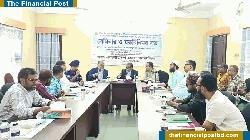Chief Adviser Professor Muhammad Yunus is scheduled to meet today with Kristalina Georgieva, managing director of the International Monetary Fund (IMF), to discuss possible avenues for further support to Bangladesh and the potential structure of such assistance.
The meeting comes after an exchange of letters earlier this year. On May 1, Yunus wrote to Georgieva thanking the IMF for its $4.7 billion loan programme and outlining Bangladesh’s progress in implementing reform commitments. In reply on May 19, Georgieva reaffirmed the IMF’s readiness to continue its partnership and expressed interest in exploring expanded support, according to finance ministry officials.
Bangladesh has so far received $3.3 billion through the Extended Credit Facility (ECF) and Extended Fund Facility (EFF), along with $1.4 billion under the Resilience and Sustainability Facility (RSF). The overall programme has since been extended to $5.3 billion, with the final two tranches expected within the next year.
Officials indicate the Chief Adviser may seek additional financing to address mounting climate risks. Finance Adviser Salehuddin Ahmed recently estimated that Bangladesh requires around $30 billion to manage climate-induced disasters effectively.
An IMF programme paper released last June noted that Bangladesh ranks among the countries most exposed to natural disasters, warning that tropical cyclones alone could inflict damage of between 1.5 and 6 percent of GDP by 2050. Such shocks risk undermining growth, pressuring reserves, and raising public debt while disproportionately impacting the poor.
To help bridge this gap, the Bangladesh Climate Development Platform (BCDP) was established earlier this year to scale up climate finance. The RSF has already proven pivotal in reducing long-term risks and catalysing additional flows of climate-related funding, the IMF said.
Despite progress, the financing gap remains wide. According to World Bank data, annual government spending on climate measures is still below 1 percent of GDP, far short of the 3–4 percent needed over the next 15 years. The IMF has stressed that successful implementation of reform measures under the RSF will be essential to unlocking further support.
Beyond financing, the IMF will continue assisting Bangladesh in strengthening tax administration and banking sector reforms. Following IMF guidance, Bangladesh Bank has initiated a merger process involving five lenders—First Security Islami Bank, Social Islami Bank, Union Bank, Global Islami Bank, and Exim Bank—aimed at consolidating the financial sector.
FP/MI


 Journalists need financial protection: Press Council Chairman at Sreemangal
Journalists need financial protection: Press Council Chairman at Sreemangal
 Press Council workshop in Moulvibazar to prevent media misreporting
Press Council workshop in Moulvibazar to prevent media misreporting
 JUCSU Polls: Independent Abdur Rashid grabs VP, Shibir’s Mazhar bags GS
JUCSU Polls: Independent Abdur Rashid grabs VP, Shibir’s Mazhar bags GS
 ‘Suspected foreign agent’ sent to jail
‘Suspected foreign agent’ sent to jail
 US Tariff reduction possible if trade deficit narrows: Adviser
US Tariff reduction possible if trade deficit narrows: Adviser